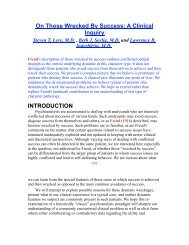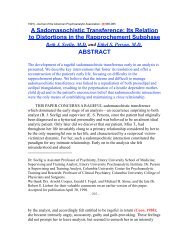The Rape of Medusa - Beth J. Seelig, MD
The Rape of Medusa - Beth J. Seelig, MD
The Rape of Medusa - Beth J. Seelig, MD
Create successful ePaper yourself
Turn your PDF publications into a flip-book with our unique Google optimized e-Paper software.
envy were foreign to the ancient Greeks and are not central to understanding their<br />
mythology. However, one can also argue that it is useful to employ a myth as<br />
illustration, independent <strong>of</strong> its origin, and this is my intent. I do not wish to engage<br />
in a dispute about the culture <strong>of</strong> the ancient Greeks, rather, I wish to borrow their<br />
robust imagery as metaphoric illustration <strong>of</strong> some powerful psychodynamic issues.<br />
In this regard, I agree with Arlow's perspective on psychoanalysis and mythology.<br />
Psychoanalysis sees mythology as a concretization in the form <strong>of</strong> an<br />
unconscious fantasy <strong>of</strong> the wishes <strong>of</strong> childhood. Derivatives <strong>of</strong> these<br />
fantasies are projected on to some historical, mythological figure <strong>of</strong> the<br />
past, who in the myth acts out a direct or symbolic representation <strong>of</strong> the<br />
unconscious wishes shared in common by the members <strong>of</strong> the community<br />
who sustain the myth (1982, p. 187).<br />
<strong>The</strong> Myths <strong>of</strong> Athena and <strong>Medusa</strong><br />
<strong>The</strong> virgin goddess <strong>of</strong> wisdom Athena, born from the brow <strong>of</strong> her father Zeus,<br />
is generally portrayed bearing a spear and wearing the image <strong>of</strong> <strong>Medusa</strong>'s head on<br />
her shield or breastplate. She has been regarded (Balter, 1969) as a phallic woman.<br />
However, the story <strong>of</strong> the conception <strong>of</strong> Athena makes her a far more complex and<br />
interesting figure.<br />
Athena was originally conceived in the womb <strong>of</strong> the goddess Metis, with<br />
whom Zeus had one <strong>of</strong> his many affairs. However, Zeus received a prophecy that<br />
the child <strong>of</strong> Metis, whose name means ‘council’, would be very powerful. His<br />
solution to the problem was to swallow the pregnant goddess. Subsequently he<br />
gave birth to the child Athena from his brow.<br />
<strong>The</strong> image <strong>of</strong> the snake-haired female monster <strong>Medusa</strong>, one <strong>of</strong> three sisters,<br />
the Gorgons, is familiar to everyone. <strong>Medusa</strong>'s hideous face had the property <strong>of</strong><br />
turning to stone anyone who gazed upon it. She was slain by the hero Perseus with<br />
the assistance <strong>of</strong> Athena and Hermes. Perseus used the petrifying power <strong>of</strong> her<br />
severed head to secure his promised bride Andromeda. Athena is later portrayed<br />
wearing the visage <strong>of</strong> <strong>Medusa</strong> on her breastplate or shield.<br />
<strong>The</strong> severed head <strong>of</strong> <strong>Medusa</strong> attracted Freud's attention. He regarded the<br />
hideous face <strong>of</strong> <strong>Medusa</strong> as representing the horrifying penisless female genital, in<br />
particular the genital <strong>of</strong> the mother (Freud, 1922). <strong>The</strong> multiple snakes <strong>of</strong> her hair<br />
both disguised<br />
- 897 -<br />
and expressed the mother's terrifying state <strong>of</strong> castration. <strong>The</strong>re is, however, a tragic<br />
prehistory <strong>of</strong> <strong>Medusa</strong>, not addressed by Freud. This early history <strong>of</strong> the monster<br />
sheds another light on her story and expands its latent meanings.




